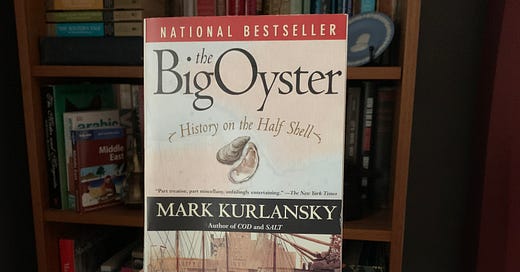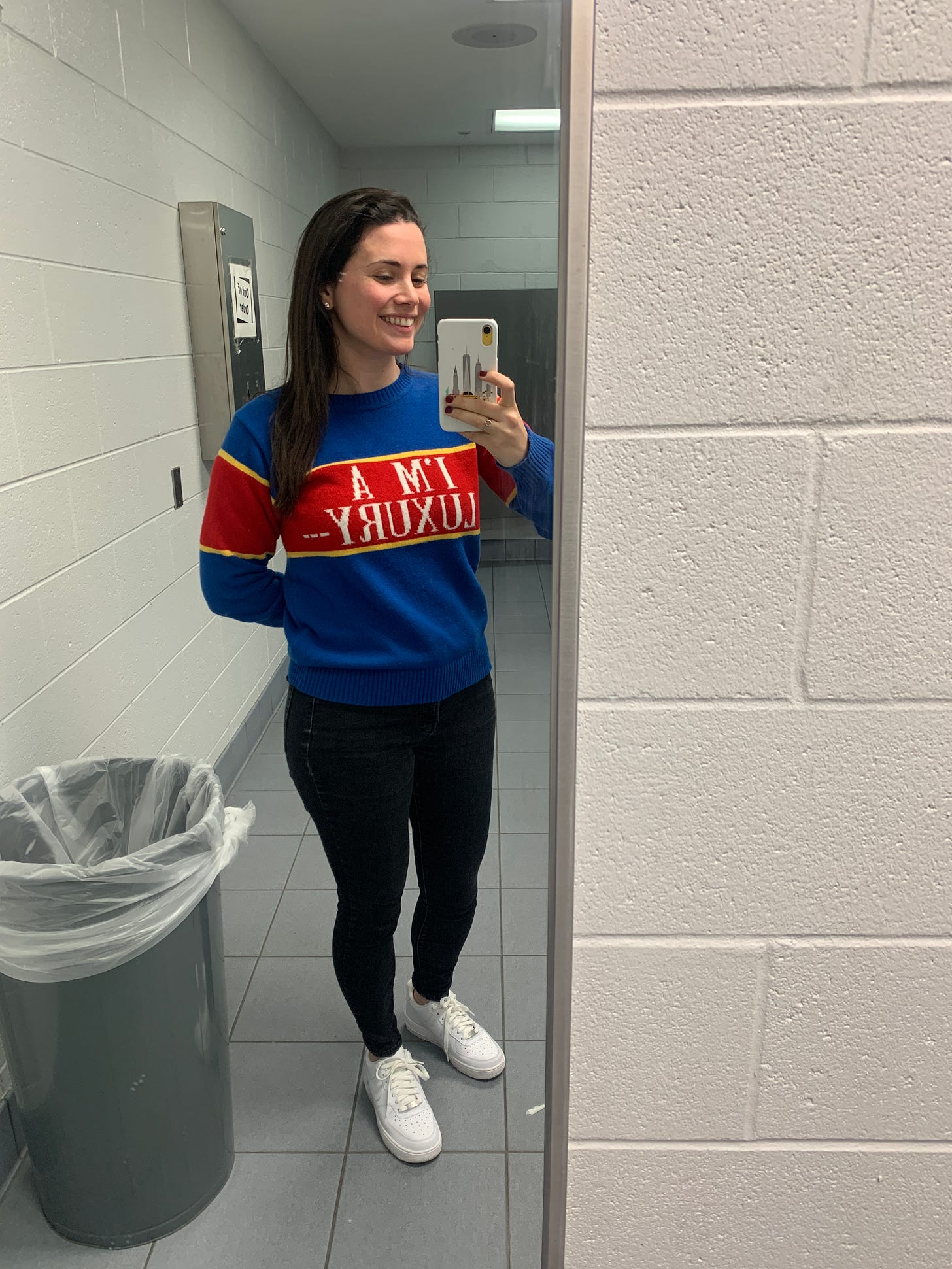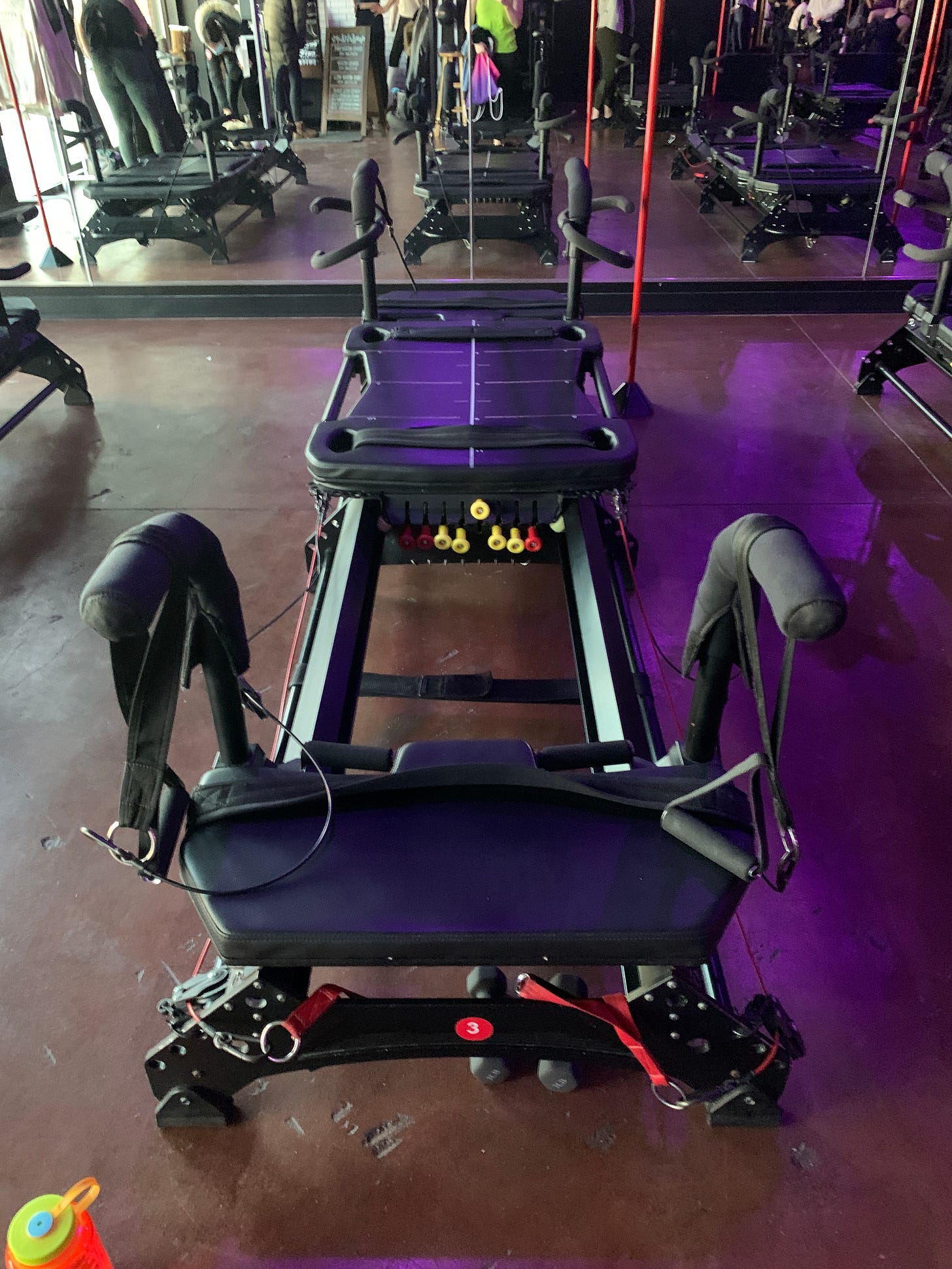OOO #4: Outfits, Ohio, and Other Things I Like
Gen Z camouflage, my favorite workout, and the best books I read in 2022.
Outfits
Ohio
I first learned about the Lagree method and Megaformer workouts during the pandemic, and I signed up for a few classes at The Butcher Shop when I moved to Columbus in August 2021. I was instantly hooked, and I have gone to a class at the Butcher Shop weekly since then.
The Lagree method kicks my butt every time (still, even after a year and a half of consistent classes), and it’s satisfying to feel muscles working—and later aching—that I didn’t even know I had. I have also noticed it’s had a sizeable impact on my balance and strength during yoga.
The Megaformer itself looked super complicated when I walked in for the first class (there are straps… and springs… and two (!) platforms… and a moving carriage), but my instructor gave me an effective rundown of the machine before class and stayed pretty close during class to help me out. It looks way more intimidating than it actually is!
Rec: The Butcher Shop (either location), but I really like Mona’s classes in German Village.
Other Things I Like
I was lucky enough to read 38 books last year, and I’m hoping to read 40 this year.
I compiled a list of my favorite books that I read in the last year; I try to read a wide range of books in terms of genre, time-period, author’s background, and subject, so hopefully you’ll find something to check out (metaphorically or out of the library) on the list below.
The Big Oyster: History on the Half Shell by Mark Kurlansky. Admittedly, I love a popular history book whose premise revolves around the idea that one item (jewels, salt, clothing) is responsible for the rise and fall of great empires. If you consider New York a great empire (and I do... I mean, it’s called the Empire State for a reason), this counts as one of those books. Kurlansky examines the interconnected histories of the growth of New York and its oyster beds. I learned a lot about the history of New York (a beloved topic) as well as the biology and ecology of oysters (not a beloved topic, but interesting nonetheless). Even though, according to my favorite podcaster Will deFries of
, oysters are out in 2023, this book is my top recommendation for the year.Venice: A History by Thomas F. Madden. I read this as a primer on Venetian history before I went to Venice this past summer, and that decision made my time in La Serenissima so much more special. I did not know anything about Venice’s 1000-year-long republic, nor did I know that Napoleon was the person who brought an end to that republic (although the decline of Venice’s power and wealth had started to fade long before Napoleon’s invasion). While quite dense, this is definitely worth the read if you love Venice, are going to travel there, or are generally interested in Mediterranean and/or medieval history.
My Sister, the Serial Killer by Oyinkan Braithwaite. A slick, wild, well-written, and fast-paced novel that I still find myself thinking about. If you’re looking for something to jumpstart your love for reading novels again, this is it. Five stars. Top Shelf. No notes.
The Lightning Thief (and the rest of the Percy Jackson & the Olympians series) by Rick Riordan. I read the first Percy Jackson novel by request of one of my former students, and I loved it. I don’t often read YA, but I think I read the last book of the series in full the day I checked it out of the library. The adventures are well-crafted, the characters are memorable, and Riordan is both detail-oriented and a great story-teller. The series also has both optimism and honor rooted as its main values, which anyone can use a dose of from time to time.
Emily Wilson’s translation of The Odyssey by Homer. A former colleague who is a Classicist by training highly recommended Wilson’s translation of The Odyssey. While I have absolutely no expertise to offer on that topic, I thought this was a great translation of a 3,000 year old text. Wilson’s explanation of the choices she made as a translator was fascinating and thought-provoking, and I thought she did a great job making the text accessible to modern, English-speaking audiences. I also didn’t know that Athena was such an integral character to the story, so that was a joy to discover.
Memphis by Tara Stringfellow. Full disclosure: I once worked with Stringfellow, BUT I’m certain I would have recommended this book regardless. Stringfellow’s book was definitely the best written novel that I read in 2022 (the word “lyrical” comes to mind about her writing style), and I really look forward to reading more of her work in the future.
The Murder of Roger Ackroyd by Agatha Christie. There is a reason that Christie is referred to as “The Queen of Crime,” and The Murder of Roger Ackroyd is definitely one of her best. I’m pretty sure there is at least one cringey thing in every Christie novel that has not aged well, but if you are willing to look past that, Christie’s mysteries are the best out there.
Red, White, and Royal Blue by Casey McQuiston. This was a fun and well-done summer read. Plainly: it’s a enemies-to-lovers plot where the enemies are the FSOTUS (I think that’s the acronym for the President’s son; my cursory google search turned up nothing, and I am frankly too lazy to figure out what it really is) and the Prince of Wales. I thought it was also comforting to read a novel about politics where the characters had hope about the system working out for the benefit of the American people (in a West Wing kind of way).
Lessons from the Edge by Marie Yovanovitch. I wrote a lengthy review about Yovanovitch’s book on Goodreads, but the main takeaway is this: The first half is her memoir about her time as a diplomat in the Foreign Service, and the second half examines the smear-campaign against waged her, her dismissal from her post, and the subsequent hearings. Lessons from the Edge was a good reminder of the grotesque shift in the Overton window of what should be considered appropriate and acceptable behavior by senior officials in the Executive Branch that took place during 45’s administration. If any of that is interesting to you, I recommend it.
Henry VI Pt. 3 and Richard III by William Shakespeare. Both Henry VI Pt. 3 and Richard III are my favorite type of Shakespeare history plays: full of political intrigue, monologues, and an excessive amount of stabbings. Richard III was also the last Shakespeare play on my list; I’ve now read all of Shakespeare’s plays, and plan to read his sonnets and his narrative poems in 2023 to complete my bucket-list goal of reading all of Shakespeare’s works.
Side note: Someone did ask me if I was a history teacher on the Doge’s Palace tour because I knew all the answers to the tour guide’s questions—all credit must go to Thomas F. Madden and Venice: A History.
That’s it! I hope you have a great rest of your week!








